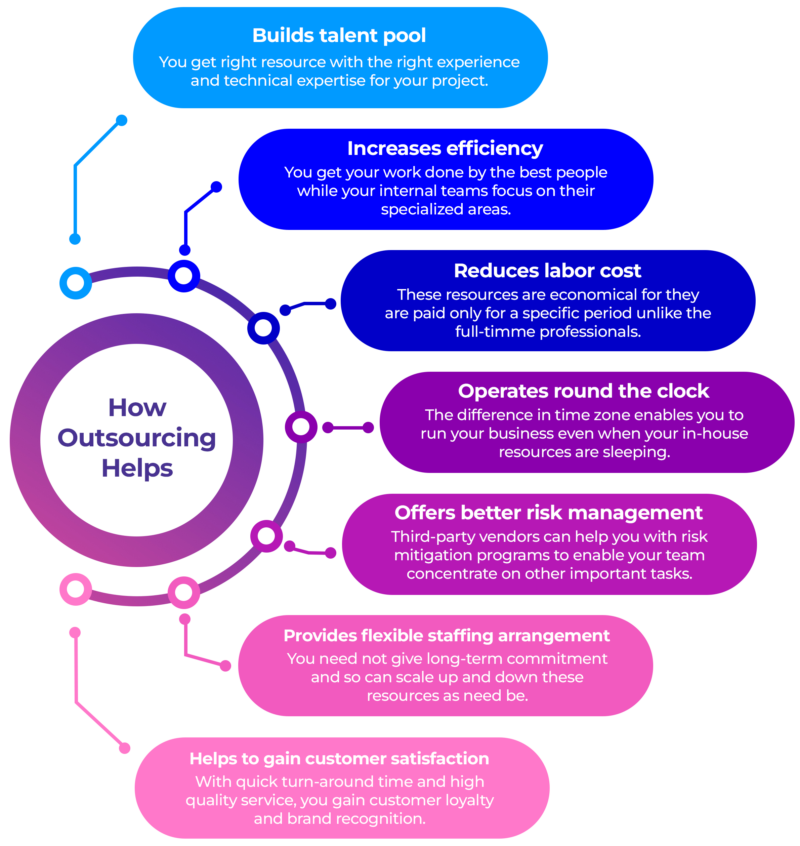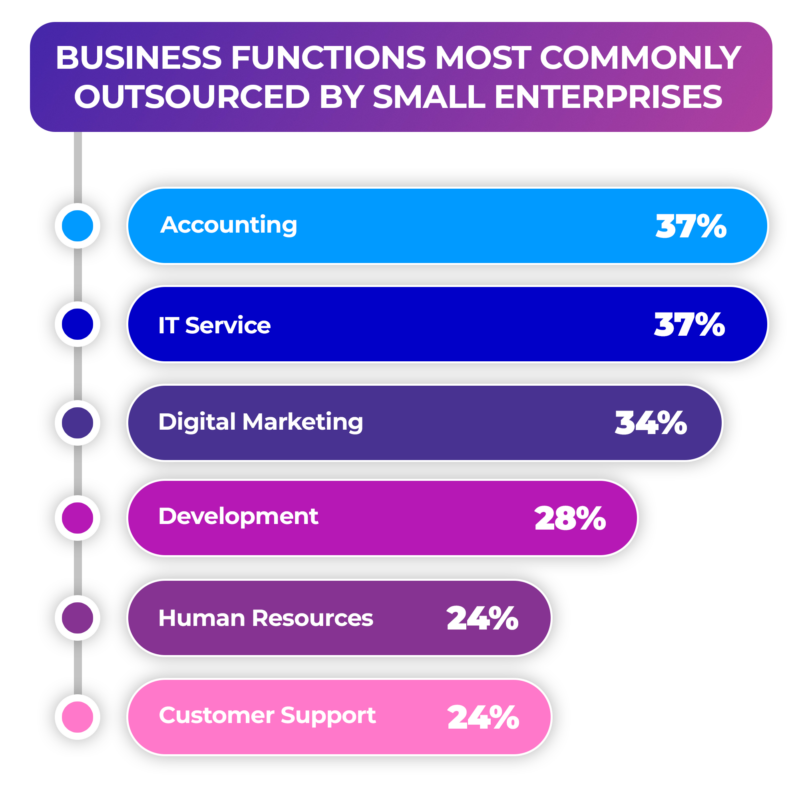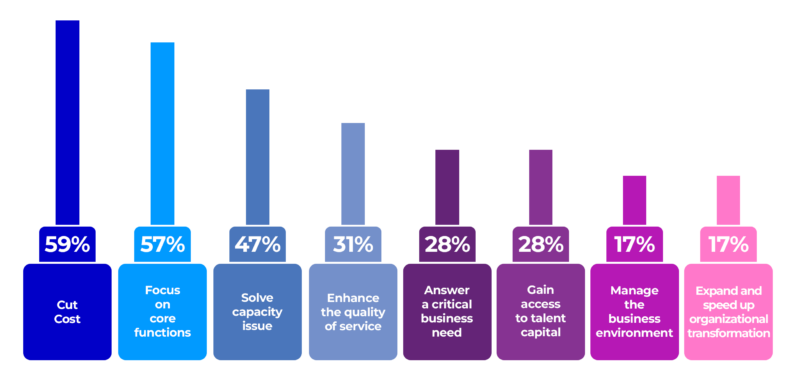Outsourcing services have become a cornerstone for contemporary businesses aiming to optimize their operations and zero in on their primary strengths and core competencies. The act of choosing the correct service provider for outsourcing is not just a minor decision; it often stands as a pivotal turning point, marking the distinction between achieving great success and facing unfortunate failure in business processes. Undertaking a thorough and diligent vetting process is not only advisable but essential. It ensures that companies foster a collaboration that benefits both parties involved.

This article aims to shed light on and provide guidance through crucial questions that businesses must consider as they traverse the intricate labyrinth of decision-making in the world of outsourcing.
Understanding Their Expertise
Before diving into any collaborative ventures or partnerships, it’s paramount to grasp the core competency of the potential partner you’re considering. When evaluating outsourcing providers, one must thoroughly assess their primary strengths and capabilities.
Ask: “What is your core competency?”
Engaging with an outsourcing service provider whose specialized expertise complements the skills of in-house employees can significantly bolster a company’s overall performance. This mutual understanding and synergy ensures smoother operations and provides a competitive advantage in the marketplace. By recognizing and valuing this specialized skill set, businesses can pave the way for more productive and fruitful collaborations.

Moreover, it’s crucial to probe deeper into the collective experience of the outsourced team you’re considering. The history and tenure of a team often provide insight into their capability and reliability. Experience, in many cases, is directly related to the efficiency with which tasks are executed and the subsequent quality of the output. It’s important to remember that specialized expertise is not just about having knowledge, but also about applying that knowledge effectively.
Inquiry: “How experienced is your team?”
Therefore, when selecting an outsourcing provider or when comparing various outsourcing companies, prioritize those with teams that have a robust track record. Their seasoned experience could be a testament to their refined skills and their ability to deliver top-notch work.
Scalability and Flexibility
As industries progress and the dynamics of the business world shift, the requirements and objectives of businesses inevitably undergo transformation. With these evolving landscapes, it becomes paramount for companies to be agile, adjusting swiftly to the changing tides.
In this context, when collaborating with an outsourcing partner, it’s crucial that they have the agility and infrastructure to align with these changes. Whether it’s ramping up resources to meet increasing demands or scaling down in response to streamlined strategies, the partner’s capability to modulate their services plays a significant role in the success of the partnership.
By posing the question, “How do you handle scalability and flexibility in terms of capacity?”, one seeks to gauge the adaptability and preparedness of the potential outsourcing partner. This inquiry not only delves into their current capabilities but also provides insights into their foresight and strategic planning, ensuring they are a fit for both your present needs and future aspirations.
Technological Infrastructure
Grasping the technological prowess of your outsourcing partner becomes a linchpin for a successful collaboration. Being well-acquainted with their technological infrastructure not only provides insights into their current capabilities but also speaks volumes about their commitment to maintaining state-of-the-art, secure platforms. By inquiring, “Can you provide details of your technological infrastructure?”, you are delving deeper into their technical foundations, seeking clarity on the systems and platforms they have in place.
This question serves multiple purposes. Firstly, it ensures that they are equipped with up-to-date technology, ensuring security and efficiency. Secondly, their response can shed light on their proactiveness and agility in the terms of embracing emerging technologies and tools. In a rapidly evolving tech landscape, an outsourcing partner’s willingness and ability to adopt and integrate new technological advancements can be a significant differentiator, paving the way for innovative solutions and ensuring the longevity and adaptability of the partnership.
Examining Past Performance
A company’s historical performance, particularly an outsourcing agency, can be a significant indicator of its reliability and prowess. A company’s track record isn’t just a reflection of its past; it’s a window into its potential future performance.
When evaluating a potential outsourcing partner, it’s highly recommended that you request tangible evidence of their past work. This could be in the form of references from previous clients or detailed case studies that showcase their earlier successes and the challenges they’ve faced.
By posing the question, “Can you provide references or case studies?” you’re effectively initiating a deeper dive into understanding their outsourcing process. Such materials can offer a comprehensive view of how the outsourcing company approaches a business process, how they navigate solution implementation, and most importantly, the results they’ve historically achieved. By doing this, you’re not just passively accepting their claims; you’re actively engaging in due diligence, ensuring that you make an informed choice about your next collaborative endeavor.
Punctuality, on the other hand, stands as an indispensable attribute. Especially when considering the nature of outsourcing, where adherence to strict timelines is the norm rather than the exception, the timeliness of service delivery becomes paramount. It’s not just about getting the work done; it’s about completing it within the stipulated timeframe.
As such, the reliability of an outsourcing partner is not a mere preference but a critical necessity. Therefore, when evaluating potential collaborators, it’s essential to delve deeply into their past performance.
Investigate their track record to discern if they have consistently honored their commitments and met their deadlines. A history of timely deliveries and adherence to promises can be a reassuring indicator of their dedication to maintaining professional standards.
Analyzing Communication and Management Style
At the heart of any successful outsourcing partnership lies effective communication. It serves as the foundational pillar, ensuring that both parties are aligned and informed at all stages of collaboration. When considering an outsourcing relationship, it becomes essential to query, “How do you handle communication and reporting?” This question is not just about frequency but also the depth, clarity, and relevance of the communication.
Regular updates, whether through weekly or monthly meetings, establish a rhythm that ensures all involved parties are on the same page. Moreover, these reports, when articulated in a clear and concise manner, reinforce transparency and trust. This communication strategy is even more crucial when considering the synergy between outsourced teams and in-house employees.
A well-oiled recruitment process for the external team that emphasizes communication skills can provide a competitive advantage, ensuring seamless integration and collaboration across the board. The end goal is to cultivate a partnership where both entities work in tandem, with clarity, understanding, and mutual respect driving the collective success.
Also, project management skills are indispensable. Understand their strategies for managing timelines, deliverables, and how they utilize tools like Asana or Jira to streamline processes.
Financial Considerations
The importance of thorough cost considerations in any business endeavor is undeniably paramount. Understanding the financial implications is crucial when navigating the landscape of outsourcing and collaboration. One should actively question, “What is your pricing structure?” This isn’t just a cursory inquiry; it’s a call for a transparent, detailed breakdown of all associated costs, the terms of payment, and any conditions attached. Such clarity can be instrumental in preventing misunderstandings and potential disputes down the line.
Further, it’s not just about the upfront costs. Inquire about how much access you’ll have to detailed financial records or any additional expenditures that may become relevant during project implementation. Sometimes, the most innovative ideas come with unforeseen costs. An outsourcing partner with a proven track record should be upfront about this, ensuring there are no unexpected surprises.

Additionally, delving into potential hidden fees or charges is essential. As businesses aim for cost reduction, being blindsided by unanticipated expenses can be detrimental. Whether it’s related to intellectual property rights, specialized tools, or additional resources, every cost factor needs to be explicitly outlined and understood. This ensures financial preparedness and fosters a foundation of trust and transparency between both parties.
Assessing Cultural and Operational Fit
The alignment of cultural values and work ethics plays an integral role in ensuring seamless collaborations, especially in the world of business. When two entities come together, understanding and harmonizing their respective work cultures can be the key to unlocking a successful partnership. Therefore, it’s imperative to ask, “How well does your work culture align with ours?” This inquiry delves into the heart of the partnership, seeking to understand if both parties share common ground, values, and operational philosophies.
Furthermore, outsourcing often transcends geographical boundaries, making it a truly global endeavor. With this global reach comes the challenge of navigating diverse time zones. Addressing and finding efficient solutions to these time zone differences is beneficial and vital for maintaining operational efficiency. These differences can lead to delays, miscommunications, and reduced productivity if not managed adeptly. Hence, understanding how a potential partner plans to bridge this gap and synchronize operations despite these challenges can testify to their adaptability and commitment to the partnership.
Risk Mitigation Strategies
The sanctity and security of data have ascended to an unparalleled level of importance. As businesses increasingly rely on digital platforms and tools, the risk to data security and privacy has grown proportionally. Thus, it becomes essential to pose the question, “What measures do you adopt to ensure data security and privacy?” A partner worthy of trust won’t just provide vague assurances but will demonstrate concrete steps and protocols in place to safeguard data. Ideally, they should adhere to internationally recognized standards, such as GDPR or HIPAA. These frameworks are designed to provide stringent guidelines that ensure the utmost safety of your data, reflecting a partner’s commitment to operational excellence.
Beyond data security, understanding how a potential collaborator approaches challenges is equally pivotal. Challenges and disagreements are an inevitable part of any partnership, but how they’re addressed often determines the health and longevity of the relationship. Probing into their strategies for conflict resolution and problem-solving is not just about anticipating issues but being equipped to navigate them effectively when they arise. A proactive approach in this regard can prevent minor hiccups from escalating and ensure that the partnership remains resilient and productive even in the face of adversity.
All In All
Selecting the appropriate outsourcing partner is more than just a straightforward decision; it’s a nuanced journey that demands a blend of thorough scrutiny and enlightened decision-making. Given the profound implications such a partnership can have on an organization’s trajectory, it’s essential to approach this endeavor with both caution and diligence.
The detailed journey of choosing a collaborator can often seem daunting, riddled with potential pitfalls and uncertainties. However, the previously mentioned questions emerge as beacons, shining a guiding light amidst the labyrinthine process. These aren’t just cursory or superficial queries. Instead, they serve as meticulously crafted tools, aiding in piercing through the layers of potential collaborators to discern their true essence and capability.
By adhering to this set of inquiries, organizations are positioned to make not just an informed choice but an optimal one. The aim is to ensure that the chosen partner doesn’t merely fit a checklist of operational requirements but genuinely resonates with the organization’s overarching values, ethos, and long-term objectives. In essence, it’s about laying the foundation for a partnership that’s rooted in mutual respect, shared visions, and a relentless pursuit of collective excellence.
Call To Action
Allocating sufficient time and effort into identifying the ideal outsourcing partner isn’t simply a wise move—it’s absolutely essential in today’s competitive landscape. As you navigate through the selection process, ensure that you employ these carefully curated questions with precision and thoughtfulness. Each query serves as a tool, designed to unearth nuances and help distinguish between potential partners. But the journey doesn’t end with these questions. To further equip yourself with knowledge and a more in-depth understanding of crafting triumphant outsourcing collaborations, consider diving into additional insights and resources available here. This comprehensive approach ensures that you’re making informed decisions and maximizing the potential for long-term success with your chosen partner.



Leave A Comment
You must be logged in to post a comment.